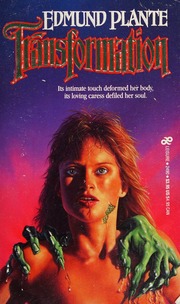 By EDMUND PLANTE (Leisure; 1987)
By EDMUND PLANTE (Leisure; 1987)
It happens sometimes that an underachieving text attains classic status in spite of itself. That’s the case with TRANSFORMATION, a 1987 paperback original whose cover art offers ample indication that heavy reading it isn’t. It is, in fact, a trash fest that was evidently inspired by a film from the previous year: THE FLY. As in that David Cronenberg directed freak-out, TRANSFORMATION revels in gruesome physical detail, all-but rubbing the reader’s nose in gore, slime and mutation. The descriptions aren’t terribly evocative (“She studied her face. Not only was it the color of mayonnaise, it was as shiny and oily as the dressing”), but it’s a harrowing read that more than delivers on its promises. Even the book’s single biggest potential drawback, the severely inflated 352-page length, works to its advantage by inflating the nastiness, which never fails to top itself.
The protagonist is Sally Phillips, a young woman who on the day of her marriage to a strapping fellow named Brad discovers an unearthly something in her bedroom closet. This sentient entity enters her body, which it comes to co-inhabit, speaking to her in an inner voice (denoted by italicized text) and causing her to do odd things like bite her hubbie’s lip as he kisses his bride and initiate a threesome with some slobs at a bar. Brad is understandably upset by such behavior and takes his leave, although he later returns (unwisely, as it transpires).
Sally also has visions of a desolate landscape packed with slimy critters—the home planet, apparently, of the what’s-it inhabiting her being. Its ambitions turn out to extend far beyond mere bodily possession; it wants to turn Sally into a being like itself, resulting in decaying flesh and gruesome mutations. Furthermore, the critter is seeking to spread its influence to other humans, meaning Brad isn’t immune from it—and yet another wrinkle is added to this twisted tale when Sally becomes pregnant…
It’s difficult to pinpoint the most outrageous of this novel’s many jaw-dropping passages. Contenders include Sally luring a pair of potential sexual partners with the line “Come on, boys. I love to be raped,” her deliberate breaking of her feet in order to dissuade Brad from taking her to a doctor and a climactic passage in which Sally and Brad intently discuss—and attempt to carry out—some especially nasty methods of suicide in order to free themselves from their extraterrestrial host’s influence.
This is gross-out fiction of an extremely rarified order. Again: TRANSFORMATION is no-one’s idea of artful or refined, but it will unquestionably satisfy the sick fuck lurking in any reader.
